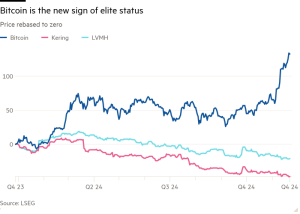Pressure mounts on VW to finally confront the reality of restructuring
Unlock the Editor’s Digest for free
Roula Khalaf, Editor of the FT, selects her favourite stories in this weekly newsletter.
To understand just how deep the challenges that Volkswagen is facing, it is worth considering the position of Gunnar Kilian.
He is the German carmaker’s head of human resources and a member of its management board. But Kilian is also former general secretary of the works council, the main body representing VW employees and now in negotiations with the company over its taboo-breaking potential first closure of a factory in Germany. And before that, he was an assistant to the former VW chair and main family shareholder.
Few people better illustrate the VW system, an interlinked network of managers, workers, politicians and family shareholders that has fostered the carmaker’s notoriously bad governance and poor financial performance. That is now coming to a head as VW faces its biggest crisis in decades as it negotiates with the works council over tens of thousands of job cuts and potential factory closures.
“Look at VW: their ability to make changes in Europe is almost zero,” said the chief executive of one of its biggest shareholders, bemoaning the strong labour rights at the carmaker.
That manifests itself in VW’s inefficiency compared with rivals. Last year, the German group sold 9.4mn vehicles, slightly higher than Toyota’s 8.8mn. But it took 684,000 workers for VW to do that against just 375,000 at the Japanese manufacturer.
Simply put, its German factories need too many workers to make a vehicle. That is what VW is seeking to rectify as it enters the second round of negotiations with the works council, due to start on October 30.
The backdrop is grim. An expensive shift from fossil fuel to electric vehicles is under way but with little guarantee of success for VW or other European carmakers against Chinese rivals that produce models that are often significantly cheaper.
VW has already announced it will rip up a three-decade job security deal that would have protected German workers until 2029 and is considering its first domestic factory closure in its 87-year history. The works council has threatened strike action and “massive resistance on all fronts and at all levels” against the plans. Germany’s government has also put pressure on VW, by reminding it of its importance to the German economy and asking it to secure all factories and avoid compulsory redundancies.
Insiders believe the conflict will grow louder still, but both sides seem keen on getting it resolved before Christmas. The question is whether VW can find what its chief negotiator Arne Meiswinkel calls a “sustainable” solution to bring its costs down for the long term.
This is where the problems of the VW system come in. All companies in Germany are subject to co-determination, where worker representatives make up half of the supervisory boards that oversee large companies. But at VW, former directors alleged to me in the past that it became closer to co-management, with workers wielding outsized influence that can often undercut what executives try to achieve.
That is also due to the position of Lower Saxony, the state in which VW is based, which is the carmaker’s second-largest shareholder with 20 per cent of voting rights, special veto powers, and two supervisory board seats. “Our role is to protect jobs,” an official in Lower Saxony once said. Together with workers, the state can form a majority in the supervisory board if they feel any job cuts or factory closures are too much.
Kilian, as head of HR, has a crucial role to play in finding a solution. It is not the first time the head of HR has belied its dull title and proved controversial. In 2005, then VW chair Ferdinand Piëch sided with the worker representatives on the supervisory board to appoint Horst Neumann, a former union official, as HR director against the wishes of his own chief executive, Bernd Pischetsrieder. Eventually, Pischetsrieder himself resigned with his hopes of a deep restructuring of VW thwarted. Herbert Diess was similarly ousted as VW chief executive in 2022 after clashing repeatedly with the works council over his attempts to reform the carmaker, including by privately suggesting it had 30,000 excess staff in Germany.
The issue goes well beyond Kilian, who declined to comment through VW’s press office. “You can’t pin this on one person. It’s about a system that I would argue has not served the company well,” said one former supervisory board member. VW has to overcome significant historical and systemic baggage to ensure this restructuring can succeed where others have failed.
#Pressure #mounts #finally #confront #reality #restructuring




